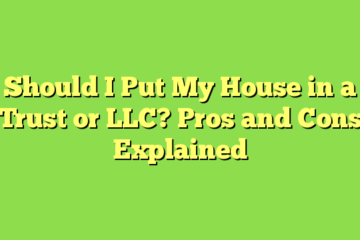As a member or owner of a limited liability company (LLC), you may find yourself in a situation where you want or need to sell your percentage ownership stake. Whether you’re looking to exit the business, need to liquidate assets, or have another reason for selling, it’s a common question: Can I sell my percentage of an LLC?
The short answer is yes, you generally can sell your ownership interest in an LLC, but there are specific processes and considerations to keep in mind. Transferring your LLC membership is not as simple as selling shares of stock. The operating agreement and state laws governing the LLC dictate the steps you must follow.
Understanding LLC Ownership Structure
An LLC is a type of business entity that provides liability protection to its owners, known as members. Each member holds a percentage ownership interest in the company, which entitles them to a proportionate share of the LLC’s profits, losses, and management control.
Reviewing the Operating Agreement
The first step in selling your LLC percentage is to review the company’s operating agreement. This legal document outlines the rules and procedures for managing the LLC, including provisions related to transferring ownership interests.
The operating agreement may include clauses such as:
Right of First Refusal
This clause gives existing members the first opportunity to purchase your ownership stake before it can be offered to outside parties.
Consent Requirements
The agreement may specify whether unanimous consent or a majority vote is required from the remaining members to approve the sale of your interest.
Valuation Methods
The operating agreement should outline how the value of your ownership percentage will be determined, such as through an independent appraisal or a predetermined formula.
Notifying Fellow Members
As a courtesy and often a requirement, you should inform your fellow LLC members of your intention to sell your ownership percentage. This open communication helps maintain transparency and prevents any surprises or conflicts down the line.
Finding a Buyer
If the operating agreement permits the sale of your interest to an outside party, you’ll need to identify a potential buyer. This could be an existing member who wishes to increase their stake, a key employee interested in becoming an owner, or an entirely new investor.
In some cases, you may be required to offer your ownership percentage to the remaining members first before seeking external buyers.
Determining the Sale Price
The value of your LLC ownership percentage will need to be determined, either through a process outlined in the operating agreement or through negotiations with the buyer.
Factors that may influence the sale price include:
- The LLC’s current assets and liabilities
- Future earnings potential
- Your percentage of ownership
- Intellectual property or goodwill associated with the business
An independent business valuation may be necessary to arrive at a fair market value for your ownership stake.
Drafting a Purchase Agreement
Once the buyer and sale price have been agreed upon, you’ll need to draft a purchase agreement. This legally binding contract should outline the terms of the sale, including:
- The purchase price and payment terms
- The effective date of the ownership transfer
- Any warranties or representations made by the buyer or seller
- Conditions that must be met before the sale is finalized
It’s advisable to have an experienced attorney review the purchase agreement to ensure it protects your interests and complies with all applicable laws and regulations.
Obtaining Necessary Approvals
Depending on the terms of your operating agreement and state laws, you may need to obtain approval from the remaining LLC members before finalizing the sale of your ownership percentage.
This could involve a formal vote or unanimous consent, as specified in the operating agreement.
Updating Company Records
After the sale is complete, the LLC’s records must be updated to reflect the change in ownership. This typically involves:
- Amending the operating agreement to remove your name and ownership percentage
- Updating the LLC’s ownership records and capital accounts
- Filing any necessary paperwork with the state, such as articles of amendment
Considering Tax Implications
The sale of your LLC ownership percentage may have tax consequences, both for you as the seller and for the LLC itself. It’s crucial to consult with a tax professional to understand the potential implications and ensure you comply with all applicable tax laws and regulations.
Seeking Professional Advice
Selling your LLC ownership percentage can be a complex process with legal, financial, and tax implications. It’s generally advisable to seek guidance from qualified professionals, such as an attorney and accountant, to ensure you navigate the process correctly and protect your interests.
Final Thoughts
While selling your percentage of an LLC is generally allowed, the specific steps and requirements will depend on the terms outlined in the operating agreement and the laws of the state where the LLC is formed.
By following the proper procedures, communicating openly with your fellow members, and seeking professional advice, you can smoothly transfer your ownership stake and move on to your next endeavor.

Alfie Wilson, Esq., is a legal content writer with expertise in business formation, criminal law, veterans disability, family law, DUI law, personal injury, animal welfare, and legal writing. He holds a J.D. from Emory University School of Law and has experience in appellate advocacy and regulatory matters. Alfie’s passion lies in breaking down complex legal topics for a non-lawyer audience. He currently writes for law firms and non-profits on various issues and resides in Arlington, Virginia.









